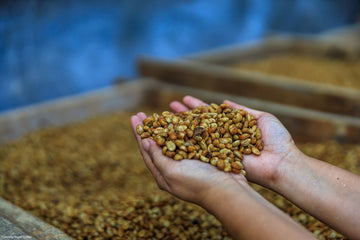Sold Out
Kenya Nyeri Othaya Peaberry
This is our third coffee from Othaya Farmer’s Coop Society and we couldn’t be happier with their work. This is a blend of Peaberry beans from across their processing stations designed to accent brightness and florality. The flavors are exceptionally well balanced with notes of peach, pear and even sweet milk chocolate.
This is our third coffee from Othaya Farmer’s Coop Society and we couldn’t be happier with their work. This is a blend of Peaberry beans from across their processing stations such as Gura and Ichamama designed to accent brightness and florality. While we tend to enjoy focusing on a single farm or processing station, we have to admit the pros have done a stellar job creating a regional blend that showcases their range!
If you love Kenyan coffee but sometimes find the “winey-ness” to be too much, this coffee is for you! Of our 3 offerings from Othaya, this one is the most bright, floral and sweet. It could easily be mistaken for a fully washed Ethiopian coffee from Yirgacheffe. It’s got a zesty citrus front end and a medium to full body and the finish is dry with a gently sweet honeysuckle flavor. We also noted a general undertone of florality through the cup. The flavors are exceptionally well balanced with notes of peach, pear and even sweet milk chocolate.
Reminder! This coffee is raw, you must roast it before brewing
Arrival Date: September 23rd, 2022. US Arrival: September, 2022, packed in GrainPro bags
Acidity & Brightness: Bright and sweet
Balance & Finish: Balanced with a dry, floral finish
Body & Texture: Medium to full bodied, smooth and silky
Flavors: Peach, pear, honeysuckle & milk chocolate
Grade: Peaberrry, grown at 1600 - 1800 masl
Processing: Fully washed and dried in raised beds
Grower: Smallholder farmers organized around Othaya Farmers Cooperative
Region: Othaya, Nyeri County, Kenya
Varieties: SL28, SL34, Ruiru 11, and Batian
Recommended Roast Range: City+ to Full City (Light-medium to medium)
We like this coffee best at Light-Medium (City+) but you can go a little lighter or darker depending on the flavors you want to accent. Lighter roasts will have more honeysuckle and more acidity, which we find a bit overwhelming. Move into Full Medium to bring out more milk chocolate tones and a touch more body. You can take this coffee up to the very first snap of second crack if you prefer to subdue the acidity even further.
Royal Coffee - "Mt. Kenya, at the helm of Kenya’s Central Province, is the second tallest peak on the continent of Africa and a commanding natural presence. The mountain itself is a single point inside a vast and surreal thicket of ascending national forest and active game protection communities. The central counties of Kenya extend from the center of the national park like six irregular pie slices, with their points meeting at the peak of the mountain. Many believe the best coffees in Kenya, often the world, are crafted in the wet, high elevation communities with mineral-rich soil that reside just along the lower edge of these forests. Nyeri is perhaps the most well-known of these central counties. Kenya’s coffee sector is dominated by a cooperative system of production whose members vote on representation, marketing, and milling contracts for their coffee, as well as profit allocation.
Othaya Farmer Cooperative Society is one of key member societies of the Kenya Cooperative Coffee Exporters (KCCE) organization. KCCE is an historic organization of almost 4,000 individual cooperatives. The group was formed in 2009, with the express goal of managing marketing and exporting operations cooperatively, as opposed to contractually with third parties. The economics of smallholder systems are consistently difficult everywhere in the world, and in Kenya in particular the number of individual margins sliced off an export price before payment reaches the actual farms is many, leaving only a small percentage to support coffee growth itself. And most often this arrives many months after harvest. KCCE, by managing more of the value chain itself, can capture a greater margin on behalf of the farms. The chairman of Mahiga Factory, one of Othaya FCS’smembers, happens to also be one of the founding directors of KCCE—so, the participation of Othaya FCS in farmer-forward infrastructure in Kenya is strong.
Othaya’s member factories typically ferment for 27-35 hours depending on ambient conditions (the changing mountain climate, as for many processors, tends to dictate fermentation temperatures, and processing staff are required to check fermentation progress every three hours). After fermentation, the parchment is rinsed and the water replenished, and the clean parchment soaks for an additional 12 hours, after which it is sorted by density and brought to the tables to dry, typically for two weeks. After drying is complete the coffee is stored on site and eventually delivered to the Othaya dry mill for grading and a final density sort. The established milling and sorting by grade, or bean size, is a longstanding tradition and positions Kenya coffees well for roasters, by tightly controlling the physical preparation and creating a diversity of profiles from a single processing batch.”
















